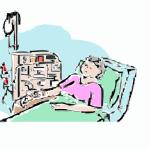During the years of my medical career, when I treated patients (always in hospitals), I was one of those rushed doctors who focused on efficiently formulating and implementing diagnostic and treatment plans rather than on the patient’s emotional n
hospice
Hospice care focuses on patient comfort during their last months of life differing from palliative care in that there is no longer any focus on “curative treatment.” Medicare has provided this benefit since 1983 requiring
With right-to-die legislation in its fledgling stages in the United States, the bioethics surrounding assisted suicide are in play as they haven’t been in the past.
Unlike our ancestors, who encountered it often, members of our modern society seem strangely detached from death. Many people have never even seen a dead body.
Brad Harris, owner of Novus Health Care Services, Inc., in Frisco, Texas, which says it "offers hospice and home health-care services", regularly directed nurses to give hospice patients overdoses of drugs to speed up their deaths,






